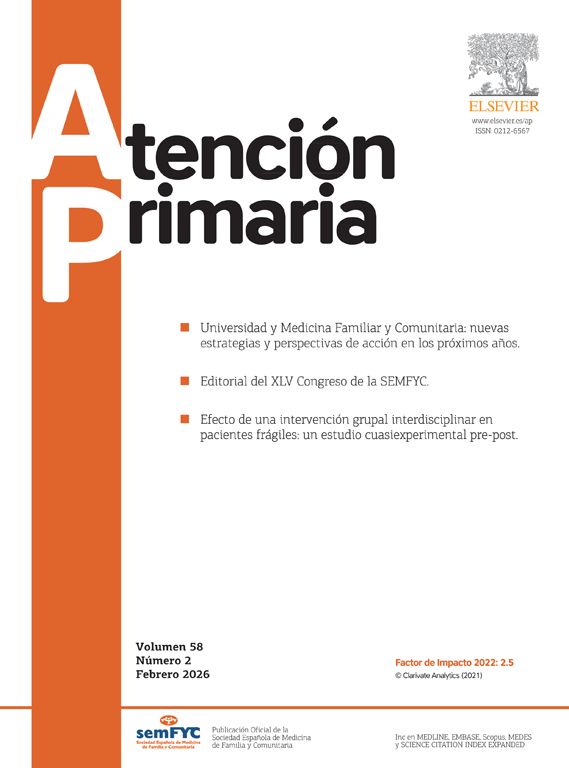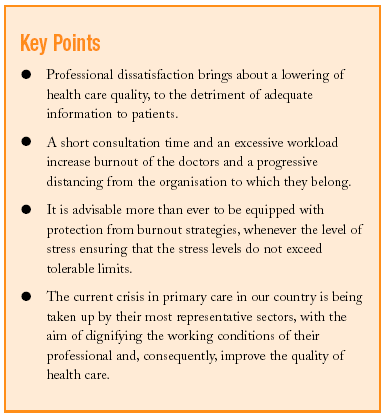There is increasingly more data which highlight that job satisfaction of health professionals is an element of the first order in maintaining quality health care.
For several years, there has been an increasingly widening debate on the progressive increase in the level of dissatisfaction of doctors in different countries, both in the out-patient and hospital environment. In our country a genuine crisis in primary care (PC) is being talked about, due to many factors, which is producing professional burnout in a high percentage of family doctors (around 30%-50%).2
It is known that burnout tends to appear in (the most vulnerable) professionals subjected to continuous stress (e.g. faced with the care of many patients within a limited time), immersed in an institutional environment which is not capable of providing the necessary support or, even, when they receive feedback on daily activity very far from professional expectations.2,3
This situation brings about a progressive distancing by the doctor (less involvement), depersonalisation attitudes (cold and distant relationships), and feelings of personal and professional frustration, with the subsequent decrease in work performance (less consultations resolved, increase in cost of referrals, unnecessary complementary examinations, etc), or simply, with higher levels of work absenteeism.2
Parallel to the presence of professional erosion, some PC experts in our country describe in detail how much doctors tend to feel injured, not only their extrinsic motivation (that derived from the compensation of receiving a salary in accordance with their responsibility and knowledge, or in relation to the recognition of their work), but also the so-called intrinsic motivations, that is, those most sensitive for the person. These latter are the personal motivations which has to do with the satisfaction produced by a job well done, which, in the case of doctors, would add a significant motivation in knowing that they have (or have not) made a real/significant influence on their patients, as well as the people with whom they work.4
The work by Pérez-Cárceles et al is a good example of a study which provides very relevant quantitative and qualitative information as regards a key question: is it true that different variables in the work environment (care pressure, number of registered patients, salaries received) and the level of satisfaction of the doctors influence their health practice?
Confronted with a wide sample of professionals, the authors analyse, by means of a self-administered (previously validated) questionnaire, the influence of different variables (socio-professional and work satisfaction) on the information provided to the patients (as regards diagnosis, the treatment, complementary examinations, prognosis, as well as the socio-professional and family impact of the process).
The results of the study reply in the affirmative to the question asked previously. Certainly, the professionals who report a low satisfaction or a certain indifference (a situation which affects a large percentage of the doctors surveyed), show a tendency to inform their patients less, especially as regards the diagnosis and the treatment of the problem as well as in relation to the social-family repercussions which can be caused by this.
Although the study provides a perspective centred on the description of the professionals themselves (a situation not looked at before in other studies), we cannot preclude a certain subjectivity in the responses as regards the frequency with which they inform the patients. It could produce a bias by default (limited information to the patient) due to the feeling of unease itself which comes with job dissatisfaction, or by excess (more information), with the aim of "painting" (more or less consciously) the results, despite the burnout that they might feel.
The characteristics of the study do not allow us to know more about the qualitative elements around the information process itself, such as the level of bidirectionality, for example, it would be, if the expectations of the consultant are taken into account, if it is information which allows a shared understanding with the patient, or about the ability to influence in the case of suggesting changes in the behaviour of this.
Even recognising the enormous importance of the fact of providing information to the patient, it is worth remembering that this in itself has its limitations and in a few cases, depending on how it is administered, it could cause iatrogenisis.
Some everyday examples could be the appearance of resistance by the patients when they feel obliged to follow a recommended therapy, to change behaviour or lifestyle or, occasionally, simply to accept a diagnosis. The difficulties grow when the doctors have to give bad news or when they have to comfort a bereavment close to their patients.
Certainly, it would be advisable to carry out more studies which might contribute information, not only on the times (quantity) when information is given, but also the manner in which this is carried out (quality).
However, and despite the limitations described, the phenomenon of a higher probability of decreasing the quality of care by the doctors who demonstrate dissatisfaction, unmotivated or with feelings of distancing as regards the organisation has been widely reported,4 and is corroborated in the study which is the subject of this editorial comment.
It is known that, even although the ways of informing adequately are easily understood by students and practising doctors, their practical application entail more difficulties than anticipated. Also, the act of providing too much information (saying too much to the detriment of the listener), does not produce better results in the interview, while it does tend to decrease patient satisfaction.
In this sense, and despite the limited average time we have available for a consultation in our country, a recent study reports that we devote an even lower percentage in evaluating the reason for the consultation (with a mean of 18.3 seconds) than providing information (advice and
treatment) with a mean of 2.4 minutes).5
It is more than likely that the working conditions in PC in our country may have created a health care culture where being in a hurry and developing increasingly shorter interviews are already seen in the first years of clinical practice, as has been reported on the third year family medicine resident training period.6 In that same study a consistent worsening of the quality of clinical relationships was demonstrated, by showing a lower ability to discuss with the patient, as well as a limited examination of the personal and contextual aspects of the reason for the consultation.
It therefore produces the paradox of training excellent doctors so that they can work in an environment which clearly limits their professional ability, reducing their expectations and, as a consequence, breeds lack of motivation in many of them.
However, it is advisable not to fall into the trap of the fatalistic systematic critic, and to think that all the problems are exclusively due to work limitations imposed by the organisation (although recognising its great importance), without also evaluating the role which the resources of the professionals themselves play.
External (the organisation, work, group) factors, as well as internal ones (personality traits, individual and social values), are implicated in the development of burnout. Low emotional stability, as well as higher levels of tension and anxiety are among the personality traits that have been observed in doctors, and are associated with high scores in the scales for evaluating burnout.3 In this sense, a logical approach to decrease the burnout of many professionals should be centred on improving the ability of facing up to those situations which generate stress, with the aim of decreasing anxiety, provided, of course, that the stress level does not exceed tolerable limits.3
It has also been advocated that doctors learn to distance themselves "healthily" from their profession (medicine is so demanding) and that they dedicate more time to cultivate other non-professional areas of interest (friendships, play activities, etc).1
Likewise, an increase in the range of communication and clinical interview abilities enables them to deal with complex problems (where the emotions normal play an important role), with less stress, making negotiating an endless number of situations easier and clearly helping in managing the consultation time.
It has recently been reported that the professionals with good training/predisposition in this field tend to have less levels of
burnout (communication by J. Cebrià and C. Palma, in XIV Taller Nacional de Entrevista Clínica, Alfaz del Pí, May 2004, semFYC) (National Workshop on the Clinical Interview).
Therefore, it seems logical to develop a more specific training for the job of family doctor, where knowledge of the elements of communication, and by extension, the emotions (their own, as well as those of the patient) have a fundamental role.
We need to think seriously about the human aspects of the health relationship, which would enable the family doctor to receive more qualitative feedback of what really happens in their clinics and that, through this, they might be able to implement new forms of approach, as well as correcting those that not only do not work, but also causes stress.
Even so, we cannot ignore that the job of the doctor has traditionally followed a complex path, full of obstacles and limitations, while its exception was in the so-called golden age of medicine in the middle of the xx century.1
All in all, the time has come to say to enough of the motto implied by too many health managers: to obtain increasingly better indices of efficacy, efficiency and effectiveness, while they hope for brilliant results from the doctor like praying over rosary beads: "give much and ask for little." It is a chimera to want more results, when the Spanish PC has been reducing its resources, thus becoming the European Cinderella of community medicine.2
In this sense, a large group from PC in our country, represented by the most important professional and scientific societies, as well as different health user associations, have agreed and signed several platforms developed by the "Platform 10 minutes" which has recently been included in the so-called "Compromiso (Commitment) de Buitrago," with the aim of dignifying the jobs of professionals and improving the quality of our primary care (www.diezminutos.org).








